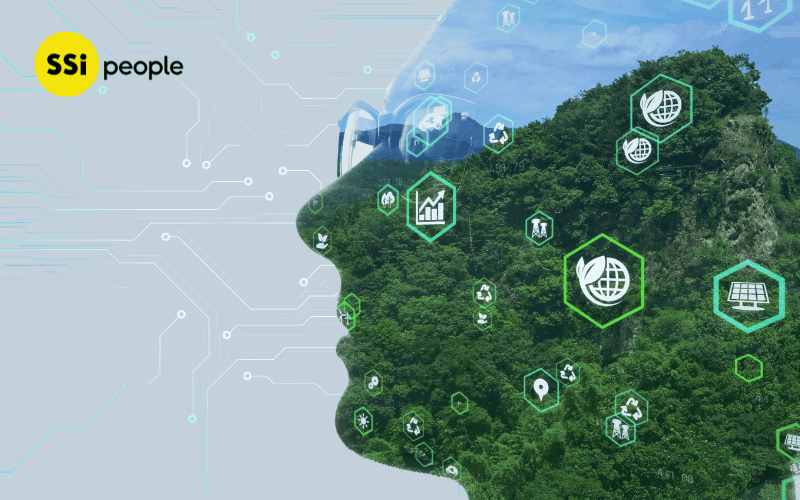The year 2025 is set to witness significant shifts in job trends, particularly those promoting sustainability. These tech trends are driven not only by technological advancements but also by a growing emphasis on Environmental, Social, and Governance (ESG) criteria and the integration of Artificial Intelligence (AI) into various sectors.
Here, we explore how these trends are shaping the job market, with a special focus on how the staffing industry needs to rise to meet these needs in candidate recruitment and upskilling.
Technological Advancements and Sustainability
Technological advancements are playing a crucial role in promoting sustainability. Innovations like AI and big data analytics enable companies to optimize their operations, reduce waste, and improve energy efficiency. For example, AI tools can assist analysts in gathering and organizing data instead of time-consuming manual processes. Not only does this save time, money, and efficiency, it also clearly depicts the company’s environmental state on sustainability and offers action items towards goals. AI can provide a comprehensive image of a company’s environmental impact locally and globally.
Some of these positions include the following:
- Environmental Protection Specialist: Identifying, preventing, and repairing damage caused by pollution.
- Urban Planner: Planning land use to benefit projects while mitigating environmental impact.
- Software Developer: Creating and maintaining software applications.
- Data Analyst: Analyzing data to provide insights and support decision-making.
- Cybersecurity Engineer: Protecting systems and networks from cyber threats.
- AI Specialist: Developing and implementing artificial intelligence solutions.
- Automation Engineer: Designing and implementing automated systems.
ESG Criteria for Sustainability and Tech Job Opportunities
The emphasis on Environmental, Social, and Governance (ESG) criteria is reshaping the job market and creating new opportunities for professionals who can drive sustainability initiatives. High-paying ESG roles, such as Chief Sustainability Officers, ESG Analysts, and Renewable Energy Project Managers, are in high demand. These roles require a combination of technical skills and a commitment to sustainability, making them ideal for the new graduates looking to contribute to meaningful change and for current workers who are upskilling to meet the demands of the tech trends in today’s workplace. Examples include:
- ESG Analyst: Assessing environmental and reputational impacts of projects and investments.
- ESG Consultant: Providing external perspectives and devising action plans for ESG improvements.
- ESG Engineer: Designing solutions to reduce excessive energy use and other environmental concerns.
AI and Sustainability
AI is another transforming element in the sustainability landscape, influencing both tech trends and the evolution of new job opportunities. AI provides new tools to track emissions, optimize supply chains, and enhance transparency. AI-powered tools like satellite imagery and drone monitoring can track the health and growth of trees planted for carbon capture, providing real-time updates on environmental projects. This technology helps achieve sustainability goals and creates job opportunities for individuals with expertise in AI and data analysis. A few positions the staffing industry will need experts on sourcing in 2025 going forward are:
- AI Data Analyst: Analyzes recruitment data to improve hiring processes and outcomes.
- AI Environmental Analyst: Uses AI to analyze environmental data and develop strategies for reducing carbon footprints.
- AI Renewable Energy Specialist: Develops AI solutions to optimize renewable energy sources like solar and wind power.
- AI Smart Grid Engineer: Designs AI systems to manage and optimize energy distribution in smart grids.4
Staffing Candidates in Sustainable Jobs
Staffing firms play a crucial role in connecting skilled people with job opportunities for the new tech trends and sustainable jobs emerging in the market. By focusing on individuals’ unique skills and experiences, these firms can help bridge the gap between job seekers and employers looking to promote sustainability and fill the needed technology knowledge gap.
Programs that provide training and support in green jobs and technology can further enhance employability and contribute to a more advanced workforce. Not only new graduates but also upskilled workers and tech-savvy workers are a good fit for the demands coming in 2025.
Be Ready to Meet the Demands of Tech and Sustainability Needs in 2025
The tech trends of 2025 are increasingly focused on promoting sustainability, driven by technological advancements, ESG criteria, and AI integration. Staffing firms have a significant role in connecting job seekers with these opportunities, helping to create a more inclusive and sustainable job market. However, the staffing industry will continue to evolve to understand new skills needs, opening the door for recruiter training on these new career paths and job roles.
These tech roles not only drive sustainability efforts across various industries, helping to achieve environmental goals and promote a greener future, but they also create a new dynamic within each company. By leveraging these tech trends, companies can work towards a future where sustainability and industry growth go hand in hand.

